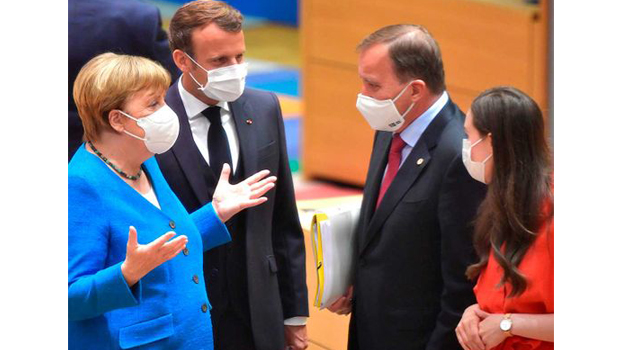Rebuilding Europe after the pandemic
This year Merkel, one of the most powerful Western leaders, will leave German politics


After 46 years fully bound to the political, economic and social norms as a member of the European Union or in transition from its membership, the United Kingdom began a new chapter in setting its own course from New Year’s Day 2021.
Barely two weeks, negotiators from London and Brussels hammered out a deal on the future relationship between the UK and the EU for the decades to come. When the process of formal recognition for the deal has yet to be completed, its provisions take effect, meaning UK exporters face more paperwork in sending their goods to market across the 27-member bloc.
Formally called the Trade and Cooperation Agreement, it covers issues like security, energy, transport and social welfare as well as trade, involved compromises on both sides and leaves Britain with a significantly weaker economic relationship with the EU.
At the heart of the deal is tariff-free, quota-free access to each other’s market for goods, making it more expansive than any trade deal the EU has previously agreed with other major economies. The two sides have agreed to introduce trusted trader schemes and self-verification systems to reduce the impact of the hard customs and regulatory border that will apply to all parts of the UK except Northern Ireland from January 1 from January 1st.
But there are still checks and increased bureaucracy which will make trade costlier and more cumbersome and British produce authorisations will no longer be automatically accepted by EU regulators.
While the Brexit deal may be in place now, its repercussions and recriminations will still be evident come May 6. Then, as well as elections for new city and county councils across the UK, voters in Scotland and Wales will also choose new parliaments for their assemblies in Edinburgh and Wales.
UK Prime Minister Boris Johnson will be watching the outcome in Scotland intensely given that the current Scottish administration between the Scottish Nationalist Party and First Minister Nicola Sturgeon are ardent opponents of Brexit in any form — and are seeking a strong mandate for a second independence referendum there.
The pandemic allowed Sturgeon to set a distinct path to that chosen by Westminster when it came to lockdowns — health is a power devolved to the regional assemblies of the UK — and the SNP’s calls for independence have garnered growing and majority support in opinion polls as 2020 progressed.
Calls for Scottish independence
Come May 7, if there is indeed a strong SNP majority returned to the parliament at Holyrood, those calls for independence will only grow louder.
Within days of the New Year, Johnson and Sturgeon have both imposed new lockdowns, returning the UK to social and economic hibernation to try and stem the new fast-spreading variant.
The coming 12 mounts will also see Germans elect a new federal government in balloting set for September 26. After more than two decades leading Germany, as a strong presence on the global stage and as the de facto leader of Europe, Angela Merkel is set to step aside then.
Those roles on the European and global stages that President Emmanuel Macron of France will be eager to fill — he faces re-election in the spring of 2022 and will view Merkel’s departure as an opportunity to raise his profile.
Over the past seven years, the far-right Alternative for Germany (AfD) party has seen its support grow — particular in the regions that previously made up the former East German state. Whether it can grow further and gain from Merkel’s retirement will be one of the closest-watch elements of the federal election.
Come March 17, voters in the Netherland will head to the polls to elect a new parliament, with the coalition of Prime Minister Mark Rutte facing a tough challenge. For sure, the new parliament will be fractured, meaning talks to form any new government will take weeks.
It took Rutte almost a year to cobble together this last coalition. It’s not as if the Dutch aren’t used to long periods of non-governing government, and it took 208 days in 1977 for one government to be formed.
Faith in the pan-European movement
The inauguration of President Joe Biden in Washington three weeks from now will allow Europe an opportunity to reset its relations with the United States. The incoming US president has already indicated he wants to reaffirm Washington’s commitment to the North Atlantic Treaty Organisations and rejoin the Paris climate accords.
The leadership of the EU will be eager too to ensure that President Biden restores his faith in the pan-European movement and its principles of liberal democracy and the free movement of trade, services and people. Certainly, one of the fast stops for Air force One will be Brussels — both to the headquarters of Nato and of the EU.
In London, Prime Minister Johnson will be eager to reset the special relationship between London and Washington, while the new leadership in the Oval Office will no doubt also use any such trip to include a stop in Ireland.
While President has strong historic and familial ties to the island, he will likely wish to make a point that the UK’s newfound status as a trading partner with the EU must not undermine the integrity of the Good Friday peace agreements that ended the conflict in Northern Ireland and allowed the Irish border to be open and seamless.
While the virus will be soon contained, the economic fallout will continue. The UK Treasury will have spent close to £300 billion (Dh1.45 trillion) on supporting its battered economy — the EU another €1.5 trillion (Dh6.7 trillion). Those are outlays that will have to be recovered if not now then certainly provision will need to be made in the coming years. Perhaps that will remain the greatest challenge now.
Mick O’Reilly is a Foreign Correspondent at Gulf News


